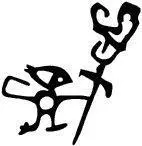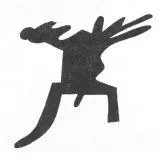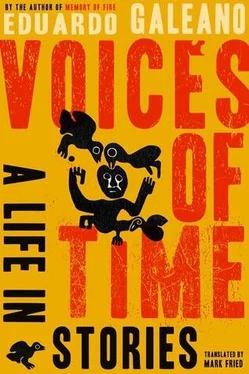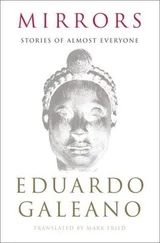In the 1996 elections, he topped all polls. He was the leading candidate for mayor in the town of Pilar, and his fame spread across Brazil’s Northeast. Tired of politicians who lie even when they tell the truth, people trusted this young even-toed ungulate bovine, commonly known as a goat, who was white with a beard to match. At rallies, Federico danced on his hind legs and frolicked persuasively to the beat of the band that accompanied him on his campaign stops.
On the eve of certain victory, he was found dead, his beard red with dried blood. Poisoned.
The Ballot and the Bullet
It was 1916, an election year in Argentina.
In the town of Campana, people voted at the back of the general store.
José Gelman, a carpenter by profession, was the first to arrive. He was going to vote for the first time in his life, and his breast swelled with civic pride. That morning this immigrant, who had come from the other side of the world, who had never known anything but the despotism of military rule in Ukraine, was about to join the democratic process.
When José went to place his vote in the ballot box, a vote for the Radical Party, a hoarse growl stayed his hand. “You picked from the wrong pile,” the voice warned.
Through the window grate he spied the barrel of a shotgun. The barrel gestured toward the correct one, the pile of ballots for the Conservative Party.

Doris Haddock, a retired worker, walked from Los Angeles to Washington, D.C. A tortoise crossed the United States from coast to coast.
She set out to decry the selling of democracy to the millionaires who finance political campaigns, and she gave speeches all along the way.
She’d been on the march for over a year, fried by the sun, frozen by the cold, blown by the wind, when she got stopped by the snow. An enormous snowfall covered the state of Virginia.
Doris celebrated her birthday in the town of Cumberland. Ninety candles. And she pressed on by ski.
For the entire last month, she skied through the snow.
She reached Washington for the birth of the twenty-first century. A large crowd accompanied her to the Capitol, workplace of the hired hands who sell their legislative services to the highest corporate bidder.
On the steps of Congress, Doris made a laconic address. Pointing at the Capitol doorway, she said, “This is turning into a bawdy house.”
And she walked away.

Civilization and Barbarism
While the gods sleep, or pretend to, people walk. It is market day in this town hidden on the outskirts of Totonicapàn, and there is a lot of coming and going. From other villages, women carrying bundles arrive by verdant pathways. Like teeth seeking a mouth, they meet up in this market today, tomorrow in another, and they catch up on everything by chatting leisurely as they sell one thing at a time.
An old woman spreads her cloth on the ground and lays out her wares: copal incense, anil and cochineal dyes, a few very hot chiles, herbs for cooking, a bowl of wild honey, a rag doll, a doll made of painted clay, belts, laces, sashes, necklaces made of seeds, combs made of bone, little mirrors. .
A tourist, new to Guatemala, wants to buy it all.
Since she does not understand, the tourist says it with his hands: everything. She shakes her head. He insists, “Tell me what you want, and I’ll tell you what I’ll pay.” And he repeats, “I’ll buy everything.” His voice grows louder. He yells. She, a seated statue, remains silent.
The tourist, fed up, storms off. He thinks, “This country is never going anywhere.”
She watches him go. She thinks, “My things don’t want to go with you.”
Trees the color of cinnamon, fruit of gold.
Mahogany hands wrap white seeds inside large green leaves.
The seeds ferment in the sun. Later, unwrapped and in the open, the sun dries them and slowly paints them copper.
Then, cacao begins its voyage across the blue sea.
Between the hands that grow it and the mouths that eat it, cacao is processed in factories owned by Cadbury, Mars, Nestle, or Hershey and is sold in the supermarkets of the world. For every dollar in the cash register, three and a half cents go to the villages from which cacao comes.
A journalist from Toronto, Richard Swift, was in one of those villages in the mountains of Ghana.
He visited the plantations.
When he sat down to rest, he pulled a few chocolate bars from his pack. Before he could take a bite, he was surrounded by curious children.
Here was something they had never tasted. They loved it.
At the dusk of the twentieth century and of his own life, Julius Nyerere spoke with the international community. That is to say, he got an audience with the big shots at the World Bank in Washington.
Nyerere became Tanzania’s first president following a long struggle against the colonial power, and he believed in independence and wanted it to be much more than a salute to the flag.
“How come you failed?” the top international experts asked him.
Nyerere answered, “We took over a country with eighty-five percent of its adult population illiterate. The British ruled us for forty-three years. When they left, there were two trained engineers and twelve doctors. This is the country we inherited. When I stepped down, there was ninety-one percent literacy and nearly every child was in school. We trained thousands of engineers and doctors and teachers. For the last ten years, Tanzania has been signing on the dotted line and doing everything the IMF and the World Bank wanted. Enrollment in school has plummeted to sixty-three percent, and conditions in health and other social services have deteriorated.”
And Julius Nyerere returned the question: “How come you failed?”

Captain Leon Rom collected butterflies and human heads. The butterflies he pinned to the wall. The heads decorated his garden. Another officer of the colonial army, Guillaume Van Kerckhoven, competed with him and claimed to be the champion head chopper.
The Congo, a hundred times the size of Belgium, was the personal property of King Leopold. A prodigious source of rubber and ivory, it was also an immense tableau of slaves enchained, flogged, mutilated, murdered.
In the year 1900, the British diplomat Roger Casement was invited to dine at the Royal Palace in Brussels. Between courses, King Leopold spoke of his mission to spread civilization and the tremendous difficulties it faced at every step. An especially huge challenge was imposing discipline on an inferior race that ignored the culture of work, especially under an African sun hot enough to melt stones.
The king acknowledged that at times his men, men of goodwill, mind you, committed abuses. The climate was to blame. “The heat is intolerable. It drives them crazy.”
At the age of twenty-six, he went under the knife for the first time.
From that point on, he lived between the operating room and the stage.
What color is the world’s summit? The color of snow. To become king of kings, tallest of the tall, he changed his skin, his nose, his lips, his eyebrows, and his hair. He painted his black skin white, sharpened his broad nose, his thick lips, and his bushy eyebrows, and sowed his scalp with straight hair.
Читать дальше















